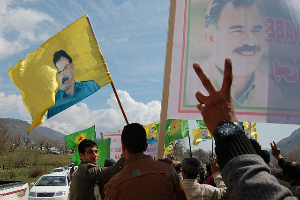Is Erdoğan Turkey’s Only Problem?
By Halil Karaveli
April 5, 2016
The outsize personality of President Erdoğan obscures the systemic dynamics that sustain his exercise of power. Erdoğan’s push for an executive presidency corresponds to the “logic” of Turkish state power. Erdoğan’s personal ambitions and raison d’état coincide to reinforce authoritarianism. Ultimately, democracy in Turkey is crippled because no major political force, representing the Turkish majority, challenges the dominant mentality that holds that the survival of the state requires the checking of ethnic and cultural diversity.
The Kurdish Nationalist Movement and the Dialogue with Öcalan
By Gareth Jenkins (vol. 7, no. 22 of the Turkey Analyst)
On November 29, 2014, Abdullah Öcalan, the imprisoned founder of the Kurdistan Workers’ Party (PKK) told a visiting delegation from the pro-Kurdish Peoples’ Democratic Party (HDP) that the Kurdish issue could be resolved – and the PKK’s 30 year-old insurgency ended – within four to five months provided that the ruling Justice and Development Party (AKP) took the appropriate measures. In reality, not only is there little prospect of breakthrough but frustration at the lack of progress has begun to highlight the struggle for relevance between different elements within the Kurdish nationalist movement.

What the Columnists Say
President Erdoğan is serious about building a mosque in Cuba and in his allegation that Muslims discovered America before Columbus, contends Fatih Yaşlı. The latest remarks of Erdoğan speak of the ideological nature of his regime, he writes. Mümtaz’er Türköne writes that the new, 1,000 room presidential palace of Erdoğan is a monument to the suspension of the rule of law. Murat Belge observes that ridding Turkey of Atatürkism has not ushered in democracy. A new Turkey will be born the day power holders abandon their palatial ambitions, Belge writes. Elif Çakır worries that there is still a risk of a military coup. Abdülkadir Selvi presents the news that Abdullah Öcalan is going to announce early next year that PKK permanently gives up the armed struggle in Turkey.

Finding a Place: The PKK's Efforts to Remain Relevant
By Svante E. Cornell (vol. 1, no. 11 of the Turkey Analyst)
In early July, the PKK terrorist organization abducted three German climbers on Mt. Ararat, in an apparent revenge for Germany’s decision to ban the PKK’s mouthpiece, Denmark-based television channel Roj TV. The episode points to the PKK’s continuous difficulties in maintaining its claim to represent Kurdish opinion, faced with multiple challenges – from both the Turkish military and governing party, who otherwise agree on little; as well as the EU’s refusal to grant the PKK legitimacy and the Iraqi Kurdish parties’ success in making Iraqi Kurdistan the beacon of Kurdish hope, eclipsing the PKK. It remains to be seen whether the PKK will be successful in taking advantage of the current Turkish crisis.
The AKP's New Dialogue with Öcalan: A Process but Which Process?
by Gareth H. Jenkins (vol. 6, no. 1 of the Turkey Analyst)
On January 9, 2013, three female Kurdish nationalist activists affiliated with the Kurdistan Workers’ Party (PKK) were assassinated execution-style in the heart of Paris. They included Sakine Cansız, the doyenne of the Kurdish women’s movement and one of the original founders of the PKK. On December 28, 2012, Turkish Prime Minister Recep Tayyip Erdoğan had announced the beginning of a new dialogue with imprisoned PKK leader Abdullah Öcalan to try to put an end to the PKK’s 28 year-old insurgency. The timing of the Paris killings has meant that they have been interpreted as being linked to the dialogue; with Kurdish nationalists and Turkish government supporters each effectively accusing elements within the other of responsibility. Although both sides have called for the dialogue with Öcalan to continue, many Kurdish nationalists have serious doubts about the Turkish government’s sincerity, suspecting that Erdoğan’s main aim is to weaken and marginalize the PKK rather than address the underlying grievances that fuel its insurgency.






